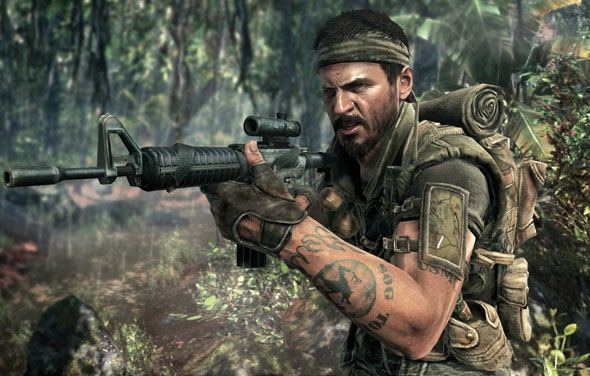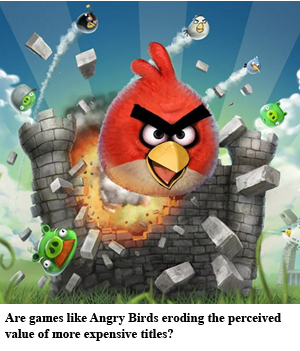This post has not been edited by the GamesBeat staff. Opinions by GamesBeat community writers do not necessarily reflect those of the staff.
 At GDC 2011, Nintendo president Satoru Iwata discussed the figurative “race to the bottom,” wherein the low-ball pricing structure of iOS erodes the perceived value of AAA games. Similarly, on Mobcast #96, the gang discussed microtransactions and indie game development. One guest remarked that a steady diet of $.99 iOS Apps had made Tactics Ogre’s $39.99 seem excessively high. I believe this is endemic of a pernicious entitlement mentality that has expressed itself among gamers in recent years.
At GDC 2011, Nintendo president Satoru Iwata discussed the figurative “race to the bottom,” wherein the low-ball pricing structure of iOS erodes the perceived value of AAA games. Similarly, on Mobcast #96, the gang discussed microtransactions and indie game development. One guest remarked that a steady diet of $.99 iOS Apps had made Tactics Ogre’s $39.99 seem excessively high. I believe this is endemic of a pernicious entitlement mentality that has expressed itself among gamers in recent years.
Last year, I penned an editorial called “The Internet Entitlement Mentality” which discussed how the digital generation had been conditioned to expect everything for free. Ensconced in righteous populist anger at “greedy” corporations, they pirate games, movies, and music, and they balk at paying for content. If only the industry(ies) would price content according to their own personal business model, they’d pay for it. I call BS. A similar entitlement mentality has taken hold amongst gamers.
Mobcast #97 touched on this topic; Cliff Bleszinski mentioned this generation’s sense of entitlement. I should parse my words, though. I don’t believe that one “type” of gaming, no matter how successful, has an inherent negative effect on other types. The market is big enough to accommodate iOS games, “casual” games, and “core” games alike. If anything, the market has expanded in the last five years. Whenever I hear developers or critics make apocalyptic predictions about core or casual gaming, I cringe. It’s bluster, pure and simple.
That being said, the current pricing structure (and the attitudes engendered by it) demands a critical eye. Is $60 too much for a new console title? That depends on how one perceives value. Many AAA shooters have single-player campaigns that run five to six hours. By contrast, a handheld title like Tactics Ogre lasts 50 to 70 hours (and costs $20 less). Is Tactics Ogre therefore a better value? Not necessarily.
We don’t normally judge games by their raw materials or on a dollar-per-hour value proposition. Much of the value we derive is perceived. If you judge a five-hour experience to be worth $60, then you’ve justified the cost. If lots of people think like you, then you have a bestseller. If more than18 million people agree with you, then you have Call of Duty: Black Ops.

A valid counterargument is that millions of people have derived many hours of pleasure from Angry Birds, which is approximately 1/60th the cost of Black Ops. But again, it’s an issue of perceived value. And the two share little in common besides both being games. Angry Birds reportedly achieved 100 million downloads across all platforms. Call of Duty: Black Ops sold nearly 19 million units. But the development costs for Black Ops were exceedingly higher than those for Angry Birds. And it’s hard to calculate how much of that $60 went to Activision — there’s the intermediary retailer, for one. And a significant percentage of AB’s 100 million were free downloads.
Still, there are many folks who refuse to pay $60 for a new game. So they wait for it to hit the used game pile, they rent it, or they pirate it, none of which directly support the developer. This disparity between rising development costs and general consumer angst has led many to declare the $60 pricing model “broken.” In the future, we may see two types of games: hi-profile AAA titles and low-rent indie titles.
 On the other end of the spectrum, there are cheapo iOS games and free Facebook titles. Of the top 25 bestselling iOS apps (as of 3/28/11), 22 are $.99, 2 are $2.99, and 1 is $1.99. Zynga relies almost entirely on the microtransaction model for its Facebook ‘ville titles. Yet, in both cases, consumers still complain. $.99-2.99 is too much, and microtransactions “exploit” the customer. This is what’s called the “race to the bottom,” as developers race to undercut each other. Consumers simultaneously want high production values and low (or non-existent) costs. This is unsustainable.
On the other end of the spectrum, there are cheapo iOS games and free Facebook titles. Of the top 25 bestselling iOS apps (as of 3/28/11), 22 are $.99, 2 are $2.99, and 1 is $1.99. Zynga relies almost entirely on the microtransaction model for its Facebook ‘ville titles. Yet, in both cases, consumers still complain. $.99-2.99 is too much, and microtransactions “exploit” the customer. This is what’s called the “race to the bottom,” as developers race to undercut each other. Consumers simultaneously want high production values and low (or non-existent) costs. This is unsustainable.
Douglas Rushkoff put it succinctly when he said, "However much we all might like free content in the short term, it is unsustainable in the long term. When nobody is paying for content, that content stops being created."
Whether the “race to the bottom” erodes the perceived value of more expensive titles is ancillary. What concerns me is many gamers’ refusal to pay anything to support their hobby, along with their indignant sense of entitlement that anyone should dare suggest otherwise. So they pirate.
Let’s examine the pirates’ main line of defense: It’s not actually stealing. Piracy doesn’t cost anyone anything. This only makes sense if we assume that every pirate is either a poor college student or low income recipient who can’t afford video games (but can somehow afford the control deck). I know a few of those. I also know quite a few people who’d prefer not to buy them. It’s near-impossible to determine whether pirates can actually afford the games they pilfer, and they know it.
I’m no economist (this should be obvious), but I know how the economy works. In the case of intellectual property (especially concerning digital IPs), there’s an implied agreement between artist and customer. We pour time and money into an IP, you support us. The value of an individual copy of an IP may be perceived value, but it’s important for the ebb and flow of the economy.
When I was younger and wanted a game, I had to either work for it (10-11 hours) or wait for a birthday/holiday. Consequently, I learned the value of hard work and transferred said value to my purchases. The implied value of my games went up, because I knew how hard it was to obtain them. Contrast that with young pirates today, who “obtain” whatever they desire instantly. What sort of value do they attach to goods that are pilfered? Inevitably, games lose their intrinsic value and the pirate expects and demands that everything should be free.
I’m not in the gaming industry, so I can say this unequivocally to gamers: Stop being cheap. If you enjoy your hobby, then support it financially. If not, then don’t play the games. If $60 is too high, then pursue other legitimate avenues of obtaining games: Gamefly, used games, eBay, etc. If you don’t support the developers directly, at least support your local retailer (without whom, the games industry would sink). Lose the entitlement mentality.
